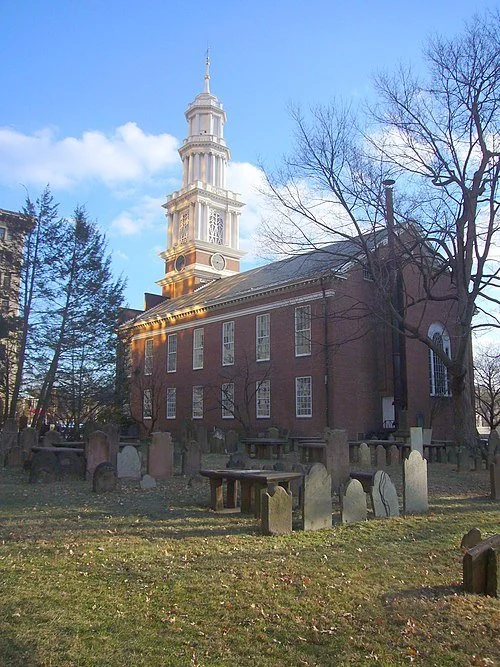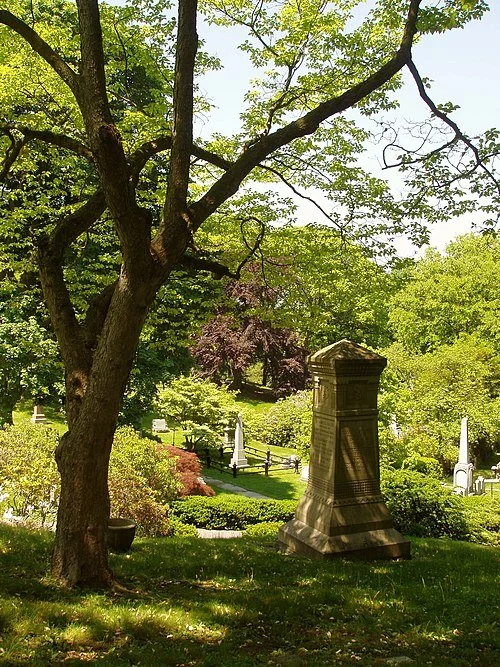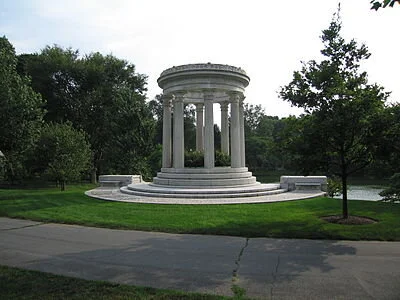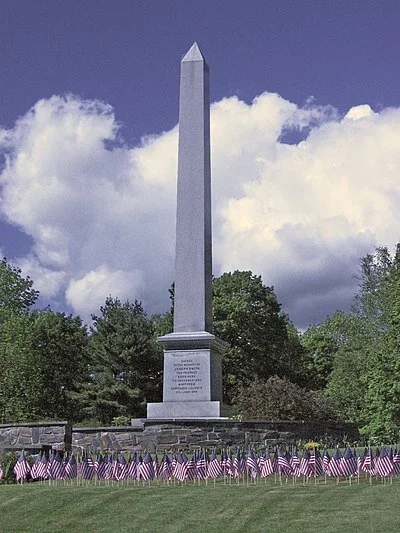
Grave matters
Part of the Ancient Burying Ground in Hartford, with the First Church of Christ (aka Congregational), the congregation's fourth church, built in 1807, next to it. The cemetery, which dates back to 1636, was the city's sole cemetery until 1803.
Adapted from Robert Whitcomb’s “Digital Diary,’’ in GoLocal24
New England Cemeteries: A Collector’s Guide, by Andrew Kull, is extensive (260 places!) and honest. He describes ugly and badly maintained and even abandoned graveyards as well as such grand, gorgeous 19th Century “garden cemeteries’’ as Providence’s Swan Point Cemetery and Mt. Auburn Cemetery, on the Cambridge-Watertown line, just outside of Boston.
Some are ancient, by American standards, with the oldest probably at Cole’s Hill, in Plymouth, Mass. (1620), and King’s Chapel Burying Ground, in Boston, dating to 1630.
Mr. Kull notes:
“People who have never paid much attention to the subject tend to think that one graveyard is much like another. In some parts of the country this is undoubtedly the case. In New England, a longer history has included changing attitudes toward death and its proper commemoration.’’
I love some of the gravestone inscriptions Mr. Kull quotes, such as this on the grave of Samuel Stone (who died in 1663) in Hartford’s Ancient Burying Ground (1636):
“Errors corrupt by sinnewous dispute
He did oppugne, and clearly them confute:
Above all things, he Christ his Lord prefer’d
Hartford! Thy richest jewel’s here interd.’’
This book was published way back in 1975 but I think it still holds up as a guide to many places, lovely or not, that inspire reflection about transitory lives and the sweep of history. Vermont native Mr. Kull (also a distinguished legal scholar) was born in 1947. But he isn’t yet a resident of a cemetery.
In Mt. Auburn Cemetery
‘Goodness its own heaven’
“Sin makes its own hell, and goodness its own heaven.’’
— Christian Science founder Mary Baker Eddy (1821-1910) in her (1875) book Science and Health With Key to the Scriptures.
Her creation of the Church of Christ, Scientist, and its associated publishing and other ventures led to her becoming a multimillionaire. It also killed some people who failed to get proper medical attention, opting instead for prayer, which Christian Science has traditionally favored over all other treatments. For that matter, Mrs. Baker argued that illness is an illusion. (This led to many sick jokes about ailing Christian Scientists.)
Mrs. Baker’s creation attracted many affluent New Englanders as adherents. But its heyday is long past. But another denomination with New England roots, Mormonism, still thrives. Its founder, Joseph Smith, was born in Sharon, Vt.
The farm in Bow, N.H., where Mary Baker Eddy was born.
Mary Baker Eddy’s gravesite in Mt. Auburn Cemetery, in Cambridge, Mass.
The Joseph Smith Birthplace Memorial, in Sharon, Vt., where the founder of the Church of the Latter Day Saints (the Mormons) was born in 1805. He was killed by angry mob in Nauvoo, Ill., in 1844. That’s where he is buried.





